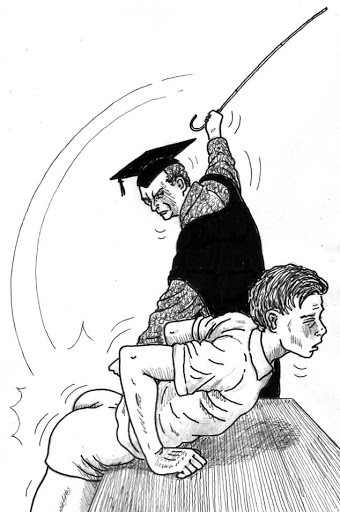Where to send your children to school if you want them beaten
Following revelations in 1994 about the former Eton headmaster Anthony Chenevix-Trench and his fondness for beating boys’ bottoms at the elite public school, the Independent on Sunday set out to discover how many British schools in still used corporal punishment.
Corporal punishment: Where to send your children to
school if you want them beaten
He that spareth
the rod hateth his son. Proverbs 13:24.
AFTER A week in which the
flogging propensities of a former Eton headmaster engaged letter-writers
throughout the land, the Independent on Sunday could find only four public
schools that admitted they still use corporal punishment.
Caning pupils is illegal in
state schools following a ruling in the European Court in 1982. The Independent
Schools Information Service and the majority of school headteachers take the
view that corporal punishment has no place in schools.
But Scarisbrick Hall co-ed
school – 515 pupils, £800 a term – at Ormskirk, Lancashire, confirmed yesterday
that it still gave corporal punishment, although rarely and only for ‘serious
misbehaviour’. St James Independent School for Boys – 336 pupils, £1,380 a term – in central London
said corporal punishment was given only by the headmaster.
No one was available at
Hulme Grammar (boys) school – a 856 pupils, £1,070 a term – in Oldham, Lancashire, to comment yesterday, but
its entry in the Equitable Schools Handbook says it uses ‘very limited corporal
punishment’.
Rodney School – 200 pupils,
boys and girls, £1,470 a term (boarders) – in Kirklington, Nottinghamshire,
holds the distinction of being the only school where corporal punishment has
been inflicted on girls recently. A spokesman confirmed yesterday that the
school retained the right to cane pupils: ‘But I haven't seen anyone caned and
I've been here since last September.’
A Department for Education
spokesman said pupils on assisted places were exempt from corporal punishment
in schools where full fee paying pupils could be caned: ‘Any schools which do
have corporal punishment have to make it known. There are really very few of
them.’
Several other schools
refused to discuss the matter yesterday, although opponents of corporal
punishment believe up to 100 small religious schools of various denominations
use corporal punishment.
It is not recorded whether
Anthony Chenevix-Trench, the former Eton headmaster, quoted Proverbs 13:24 to
the boys he flogged, but glowing testimonies from them following allegations
that he was a brute and an alcoholic suggest the essence of the quotation sank home.
Chevenix-Trench was Eton’s
head from 1963 to 1970. Claims that he became too ready with the lash and too
fond of the bottle will be published this month in Eton
Renewed, an authorised history of
the school by Tim Card, its vice-provost. Mr Card writes that staff at the
school were embarrassed by Chevenix-Trench’s drinking and that he ‘regarded
corporal punishment not as a last resort, but almost as the first’. He claims
the head was forced to resign eventually and that the matter was hushed up.
Chevenix-Trench, who died in 1979, said on his retirement that the ‘stress and
strain on a headmaster have clearly increased’.
Old Etonians and pupils of
Bradfield College, where Chevenix-Trench also taught, rallied round last week
in support of their former teacher. With one voice they spoke of beatings from
him that were, somehow, life-enhancing.
Rupert White, an Old
Etonian, said he had been beaten ‘with great courtesy and not very hard’.
Martin Marix Evans’s
beating at Bradfield was a temporary physical discomfort which ‘left my
self-respect not merely intact but enhanced’.
David Foot, who held
Bradfield’s record for the greatest number of floggings in one term, said: ‘To
the few of us who were in a position to form an objective opinion, his canings
were not to be feared, at least physically.’
Others were not so lucky.
Christopher Hourmouzios was flogged vigorously with a strap on his bare
backside at Bradfield and recalled that 20 boys received similar treatment from
Chevenix-Trench in one afternoon.
And Mr Card’s book claims
that Chevenix-Trench was aware of the possible ramifications of the thrashings
he handed out, remarking once that it was ‘a good thing the NSPCC does not know
anything about it’.
Last year the House of
Lords voted in favour of caning continuing to be permitted in public schools in
England and Wales. And last January, John Patten, the Secretary of State for
Education, said there was merit in caning being reintroduced into state
schools.
Mr Patten, who was beaten
by his Jesuit teachers at St Peter’s School in Leatherhead, Surrey, said this
was because he had failed to remember a mathematical theory. ‘The possibility
of corporal punishment being reintroduced has long gone,’ he said. ‘The
Government accepted the ruling of the European Court. But I think under certain
circumstances it can be very useful.’
As published in
the Independent
on Sunday, 1 May 1994.
Picture credit: Darrien







Comments
Post a Comment